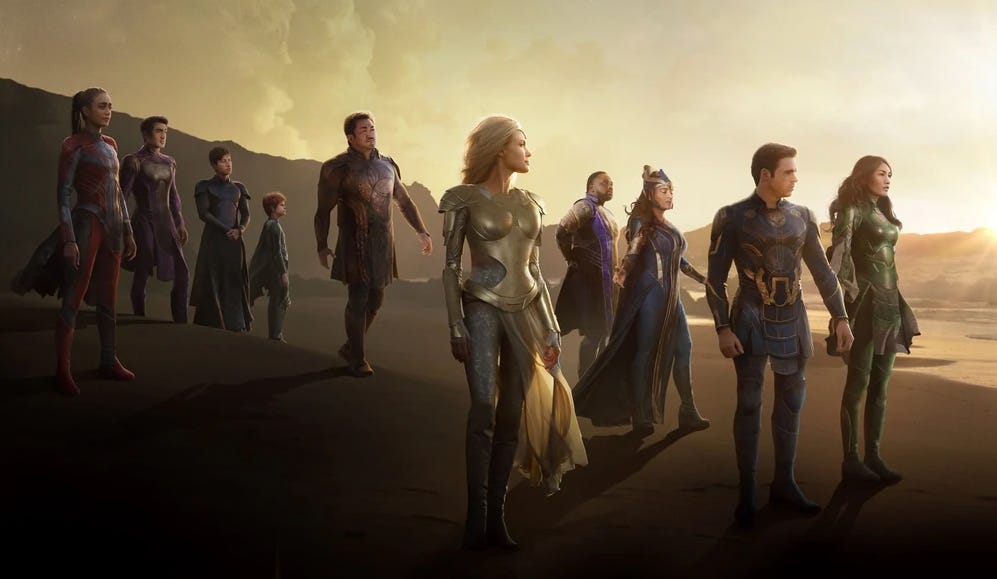Eternals
2021 Oscars' Best Director Chloé Zhao brings her touch to the Marvel Cinematic Universe
I desperately wish I could see this film again before writing this review. The range of feelings I have for it is simply a lot wider than those I’ve felt for most films this year. Some positive, some negative—many are neither. As such, it’s hard to figure out where I come down on it. Eternals is a narratively massive and thematically unwieldy attempt at an epic that, on one hand, never quite makes good on its gargantuan potential, yet on the other, shows far more ambition than most of its blockbuster peers, within and without of the MCU.
Director Chloé Zhao, who turned heads with The Rider in 2017 before winning the Academy Award for Best Director earlier this year for Nomadland, brings a broad, painterly approach to the grand tale of the Eternals—something that feels considerably different, though not always better, than its fellow Marvel Studios films.
I’ll refrain from heavily explaining the plot—not because it’s spoilery, but because it would double this already-lengthy review. This movie is a lot of setup, and lots of exposition. Fortunately, most of it is actually interesting, and critical—not only to move the story along, but also—to deepen our appreciation of the Eternals as individuals. Granted, a lot of exposition is still a lot of exposition, and at 2 hours and 37 minutes, there’s plenty of potential that Eternals may max out your capacity for it.
To put it shortly, Eternals is about angelic guardians—each with a unique set of abilities—sent to Earth by a godlike cosmic entity to protect and nurture humanity, and about the questions these angels raise about their creator’s motivations. If you want a bit more detail, watch the trailer below. It’s all you’d really need.
It’s a monster of a movie, with a lot of concepts to introduce: planet-sized space gods called Celestials, their titular angels, their flawed runaway creations called Deviants (whom the Eternals are commanded to destroy, in the name of protecting humanity), and all the rules and regulations that go along with cultivating the advancement of a species.
The sheer number of ideas being played with is, in itself, admirable. I don’t typically give a film a lot of points just for “having ideas,” but Zhao and her writing team are managing a lot of really interesting concepts at once. Not all of them—in fact, not many of them—work to their fullest, and that can make Eternals a frustrating experience. But its earnestness, amidst such a cosmically and temporally expansive backdrop, also makes it an endearing one. It’s undoubtedly Marvel’s most ambitious film ever, ideologically and thematically.
My love for that “swing for the fences” mindset with which Marvel and Zhao approached Eternals makes my disappointment with what it all builds to that much more bitter. Ultimately, Eternals plays with a lot more than it can conquer, and it sometimes feels like the concrete, real-time story being told takes a backseat to all the crazy new doors this film opens up. The characters within that story do fairly well for themselves, but the central conflict and resolution feel like afterthoughts.
The thing I can most assuredly praise Eternals for is how well the large ensemble is handled. Ten characters—the number of Eternals featured—seems like a near-guarantee that half of them won’t really matter. But Zhao manages to give even the peripheral characters plenty of scenes to flesh them out as complex people with their own wants, idiosyncrasies, and relationships with one another.
Each member of the cast brings it as well. Brian Tyree Henry gives his tinkerer, Phastos, a sense of relatable humility. Kumail Nanjiani provides the laughs as Kingo the movie star. Angelina Jolie, as the veteran warrior Thena, carries the calloused ache of trauma from a long and violent life. And Lauren Ridloff is arrestingly charming as Makkari, a plucky speedster who communicates through sign language, being the first deaf hero in the franchise. There are more, of course, and each gets at least a few good moments to shine. Unfortunately, it might actually be the two leads who suffer the most from lack of development, rather than the supports (more on that later).
It’s worth noting that Eternals features a somewhat distinct tonal language than most of the MCU. While Kingo and others do get in some good zingers, it’s not the breezy, swashbuckling quipfest we’re accustomed to from the franchise. Zhao and crew bring a slightly quieter and more forward approach to dialogue, with character interactions less-soaked in irony. It’s not necessarily better-written than most of its peers, and it sometimes comes off more stiff than honest, but it is a nice change of pace. The more direct and serious tone pronounces the mythic, cosmic weight of its ideas.
Eternals is Marvel’s first film truly built around a romance. Sure, we’ve seen plenty of Avengers pine over someone or fall in love, but normally it’s incidental to the world-ending plot. The trajectory of Eternals’ story, however, is anchored firmly around the relationship at its center: Sersi (Gemma Chan) and Ikaris (Richard Madden). When the modern-day portion of the story picks up, their millennia-spanning love affair is a thing of the past, brought to a vague and seemingly abrupt close. In fact, Sersi is now dating a normal human named Dane, played by a lovably goofy but straight-faced Kit Harington. It isn’t until Deviants—long-thought to have been defeated—begin reappearing and attack Sersi that she and Ikaris are unexpectedly united, and their unfinished emotional business is brought to the fore. Much of the action the team chooses to take, and what happens to them late in the film, relies on how Sersi and Ikaris see eye-to-eye, or don’t.
… which is why it sucks that they don’t get more interesting scenes together. Chan and Madden do what they can, but both Sersi and Ikaris are on the more stoic end of the Eternals’ spectrum of personalities. We see their love affair play out in montage, but we never really see what they saw in each other. Ikaris is a man of duty and loyalty to his cause, but there’s no expression of his personal interests or the things that make him tick. Sersi gets off a bit better; she’s a quiet but compassionate friend and sister to the other Eternals, and clearly loves the humans she watches over, as evidenced in her passion for anthropology. But she never really ever talks about herself or gets the chance to physically express much emotion.
And that may be the biggest detriment to Eternals’ impact. For all of its beautiful and grandiose storytelling about space angels questioning their purpose as agents of a cosmic creator god, it ultimately fails that relationship at its center. And, without giving anything away, that really buckles the knees of the climactic showdown that occurs in the third act, leaving us with a CGI slugfest that, while less offensive than some Marvel has put out (looking at you, Black Widow and Shang-Chi), feels considerably emptier than what could have been, its potential for emotional resonance depressingly within reach. The finale truly could have been a gut-punch to rival Guardians of the Galaxy Vol. 2, had more development and emotional context been provided.
And it is just how close the film gets to brilliance, at times, that makes it such a bummer. There are plenty of wonderful ideas, on paper, that just don’t get the time or service they need to feel like fully realized moments on screen. Guilt over terrible events, realizations of potential, and reactions to perceived betrayals—Eternals has all the weighty melodrama you could ask for in a space angel movie. And it’s well-acted, too! It’s just so rarely set up well enough to make an impact.
It goes without saying that the film is terribly bloated at times, as well. Much of the first act is burdened with constant flashing forward and back between modern-day and ancient civilization as it tries to establish every character’s place in the group, and the finale is so rushed and overstuffed that a main character literally walks out of the climax just so they don’t take up any more space, and doesn’t reappear until the film’s closing minutes.
That said, I never felt that the film was slow. For its long runtime and more restrained comedy, it moves along at a healthy clip. Action sequences, given a slightly unique flavor and presentation by Zhao, help break up the long sequences of expository dialogue—though I think most will agree that it’s the conversations, not the physical confrontations, that make the film. But it’s fun to see such a wide array of powers on display, particularly through Zhao’s lens. It’s just a shame that their most common enemy, the Deviants, are pretty uninspired in design and lack the sense of threat you’d expect.
The broad swath of responses I had to Eternals may be due, in part, to my significant emotional investment in the franchise. Generally speaking, I’m a big fan of what Marvel Studios has contributed to the adventure-blockbuster landscape and the superhero “genre.” But the past year has seen my enthusiasm for the series wane, in the face of just-okay theatrical films and a mixed bag of good and mediocre Disney+ shows. It started to feel like maybe, just maybe, Marvel was beginning to lose their touch, post-Endgame.
I was looking forward to Eternals as a potential hard-reset on my excitement for the MCU. Chloé Zhao, with two great films and a Best Director win under her belt, stood to be a huge force for change and distinction with this entry, and the premise alone seemed bizarre and exciting. It had a lot of opportunity to be the thing that got me hooked again.
As it turns out, Eternals isn’t quite that; it’s an overly ambitious mess of interesting ideas, executed to varying degrees of success. But it’s that ambition and those ideas that keep me optimistic for the franchise’s future. It’s clear now, 26 films (and a few Disney+ shows) in, that Marvel is still willing to get weird and try new things, even if it doesn’t always work to the fullest. I only hope that the worst Rotten Tomatoes score in MCU history—which seems unfair, when Incredible Hulk, Thor 2, and Captain Marvel exist—doesn’t cause Marvel Studios president Kevin Feige and his team to turn away from these odder and higher-concept entries, but rather to work harder to perfectly actualize them.
Eternals is not the amazing, franchise-rejuvenating entry to reignite the fire of enthusiasm in my heart for Marvel films... but as Rian Johnson wrote, in what might be the most vital blockbuster franchise sequel of the decade, it could just be "the spark that'll light the fire."




